1 Samuel 8 meaning explained in AI Summary
This chapter marks a turning point in Israel's history, transitioning from a theocracy (rule by God) to a monarchy (rule by a king).
- The Problem of Succession (vs. 1-5): Samuel, now old, appoints his sons as judges. However, they are corrupt and unjust, unlike their father. This failure of leadership prompts the elders of Israel to approach Samuel with a radical request.
- The People's Demand (vs. 6-9): The elders demand Samuel appoint a king to rule over them, like the other nations. This request deeply saddens Samuel, as it signifies a rejection of God as their true king.
- God's Warning (vs. 10-18): God acknowledges the people's rejection but instructs Samuel to warn them about the harsh realities of having a king. He outlines how a king will exploit them through forced labor, military conscription, and heavy taxation.
- The People's Choice (vs. 19-22): Despite Samuel's warnings, the people remain insistent on having a king. They prioritize appearing strong and unified like other nations over God's direct leadership. Samuel reluctantly concedes to their will and informs them that God has granted their request.
Key Themes:
- Human desire for control: The Israelites' desire for a visible, human king reflects a desire for control and security, even at the cost of their unique relationship with God.
- The consequences of rejecting God: God grants the Israelites' request, but not without warning them of the potential negative consequences. This highlights the principle that our choices have repercussions.
- Transition and change: This chapter marks a significant transition in Israel's history, setting the stage for the rise of Saul as the first king.
Overall, 1 Samuel 8 portrays a pivotal moment where the Israelites choose human leadership over divine guidance, setting in motion a chain of events that will shape the future of their nation.
1 Samuel 8 bible study ai commentary
The pivotal theme of 1 Samuel 8 is the tragic transition of Israel's leadership from a divinely-led theocracy to a human-led monarchy. It chronicles the people's rejection of God as their direct King, prompted by the corruption of Samuel's sons and a desire for national security and conformity with surrounding nations. The chapter serves as a solemn warning about the nature of fallen human power and the consequences of choosing human systems over divine guidance, a choice God grants while detailing its costly burdens.
1 Samuel 8 Context
At this point in Israel's history (c. 1050 BC), the nation existed as a loose tribal confederacy under the spiritual and judicial leadership of judges, with Samuel being the last and greatest. The primary external threat was the Philistines, a technologically superior enemy (possessing iron weaponry) who constantly harassed Israel. Internally, the lack of centralized leadership created instability. The surrounding nations—Edom, Moab, Ammon, and the Canaanite city-states—all had established monarchies. Israel's request for a king was thus born from a pragmatic desire for a permanent military commander and a political structure that mirrored their neighbors, failing to grasp that their unique covenant relationship with Yahweh was their true source of strength and identity.
1 Samuel 8:1-3
When Samuel became old, he made his sons judges over Israel. The name of his firstborn son was Joel, and the name of his second, Abijah; they were judges in Beersheba. Yet his sons did not walk in his ways but turned aside after gain. They took bribes and perverted justice.
In-depth-analysis
- A Familiar Pattern: The failure of the sons of a righteous leader mirrors the corruption of Eli's sons, Hophni and Phinehas (1 Sam 2:12-17). This recurring theme suggests a systemic problem beyond individual failure; power within a family lineage is easily corrupted.
- Geographical Significance: The sons judged in Beersheba, the southern frontier of Israel. This location was crucial for trade and military defense, making their corruption particularly dangerous and visible.
- Ironic Names: The names of the sons are deeply ironic. Joel (Yo'el) means "Yahweh is God," and Abijah ('Aviyah) means "My Father is Yahweh." Their actions directly contradict the meaning of their names; they served personal gain, not God.
- The Catalyst: While the people's desire for a king had deeper roots, the blatant failure of Samuel's sons provided the immediate justification and final impetus for their demand.
Bible references
- 1 Sam 2:12, 22 'Now the sons of Eli were worthless men... they lay with the women who served at the entrance to the tent of meeting.' (Parallels the corrupt children of a spiritual leader).
- Exodus 18:21 'Moreover, look for able men... men who fear God, who are trustworthy and hate a bribe...' (Direct violation of the character required for judges).
- Deuteronomy 16:19 'You shall not pervert justice. You shall not show partiality, and you shall not accept a bribe, for a bribe blinds the eyes of the wise...' (The explicit law they were breaking).
Cross references
Deut 1:16-17 (instruction to judges); 1 Tim 3:1-7 (qualifications for leaders); Amos 5:12 (condemnation of bribery); Isa 1:23 (princes love bribes); Neh 5:15 (contrast with righteous governors).
1 Samuel 8:4-5
Then all the elders of Israel gathered together and came to Samuel at Ramah and said to him, “Behold, you are old and your sons do not walk in your ways. Now appoint for us a king to judge us like all the nations.”
In-depth-analysis
- The Core Demand: The elders' request has two parts: the legitimate concern (Samuel's age, his sons' corruption) and the illegitimate motive: "like all the nations."
- Rejection of Exceptionalism: Israel was called to be a "kingdom of priests and a holy nation" (Ex 19:6), distinct from all others. Their desire to be "like all the nations" was a rejection of their unique covenant calling and divine King. They sought worldly conformity over holy distinction.
- King's Function: They ask for a king "to judge us," a role Samuel fulfilled, but they couple it later with the desire for a king "to fight our battles" (v. 20). They wanted a visible, human combination of a chief justice and a commander-in-chief.
Bible references
- Deuteronomy 17:14 'When you come to the land... and you say, ‘I will set a king over me like all the nations that are around me’...' (God's law prophetically anticipated this very request and its wording).
- Judges 8:22-23 'Then the men of Israel said to Gideon, “Rule over us...” But Gideon said to them, “I will not rule over you... The LORD will rule over you.”' (A righteous precedent for rejecting human kingship in favor of God's).
- Exodus 19:5-6 'you shall be my treasured possession among all peoples... you shall be to me a kingdom of priests and a holy nation.' (The unique identity Israel was willing to trade for conformity).
Cross references
Isa 43:10-12 (Israel as God's unique witness); John 15:19 (the world loves its own); Rom 12:2 (do not be conformed to this world).
1 Samuel 8:6-9
But the thing displeased Samuel when they said, “Give us a king to judge us.” And Samuel prayed to the LORD. And the LORD said to Samuel, “Obey the voice of the people in all that they say to you, for they have not rejected you, but they have rejected me from being king over them. According to all the deeds that they have done, from the day I brought them up out of Egypt even to this day, forsaking me and serving other gods, so they are also doing to you. Now then, obey their voice; only you shall solemnly warn them and show them the ways of the king who shall reign over them.”
In-depth-analysis
- God's Reassurance: Samuel's displeasure is personal; he feels rejected. God reframes the issue immediately: the rejection is not of the prophet, but of the King, Yahweh. This places the people's request in its proper theological context.
- A History of Rejection: God connects this event to Israel's entire history since the Exodus, classifying it as another instance of apostasy—on par with worshipping the golden calf and other idols.
- Permissive Will: God commands Samuel to "Obey their voice." This is a key biblical theme where God, in his sovereignty, gives people the desires of their heart, even when those desires are against His perfect will, allowing them to experience the consequences of their choice.
- Word - The King's "Ways": The Hebrew phrase is mishpat ha-melek ("the manner/right/custom of the king"). This is not God’s prescriptive law for what a king should do (that's in Deut 17), but a descriptive warning of what a typical Ancient Near Eastern monarch will do—exploit and oppress.
Bible references
- 1 Samuel 12:12 'And when you saw that Nahash the king of the Ammonites came against you, you said to me, ‘No, but a king shall reign over us,’ when the LORD your God was your king.' (Samuel's later summary confirms the rejection of God).
- John 19:15 'They cried out... “We have no king but Caesar.”' (Israel's leaders echo this rejection of divine kingship in their rejection of Jesus Christ).
- Hosea 13:11 'I gave you a king in my anger, and I took him away in my wrath.' (A direct prophetic commentary on this event, confirming it was an act of God's judgment).
Cross references
Luke 19:14 (citizens rejecting the nobleman's reign); Rom 1:24-25 (God gave them up); Num 11:4-6 (Israel demanding meat over manna); Psa 106:15 (He gave them their request, but sent a wasting disease).
1 Samuel 8:10-18
So Samuel told all the words of the LORD to the people who were asking for a king from him... “He will take your sons... your daughters... your best fields... he will take a tenth of your grain... your male servants... your donkeys, and put them to his work. He will take the tenth of your flocks, and you shall be his slaves. And in that day you will cry out because of your king, whom you have chosen for yourselves, but the LORD will not answer you in that day.”
In-depth-analysis
- A Litany of Oppression: Samuel's warning systematically dismantles the illusion of a benevolent king. The list includes:
- Military Conscription (v. 11): Loss of sons to the army.
- Forced Labor (v. 12-13): Loss of sons and daughters to the king's projects and court.
- Confiscation of Property (v. 14): Loss of the best land, vineyards, and groves—a violation of family inheritance rights.
- Excessive Taxation (v. 15, 17): A "tenth" (ma'aser) taken by the king, separate from the religious tithe, effectively doubling the burden.
- Enslavement (v. 16-17): The people themselves will become avadim ("slaves/servants") to the king.
- The Point of No Return: Verse 18 is the terrifying conclusion. When they experience these consequences and "cry out," God will not answer. Their choice will be sealed. They will have to live with the political system they demanded.
Bible references
- Deuteronomy 17:16-17 'he shall not acquire many horses... and he shall not acquire many wives... nor shall he acquire for himself excessive silver and gold.' (This warning stands in stark contrast to the law for Israel's king, which emphasized humility and restraint).
- 1 Kings 12:4 '“Your father made our yoke heavy. Now therefore lighten the hard service of your father and his heavy yoke on us, and we will serve you.”' (The direct fulfillment and consequence of Solomon's reign, which embodied Samuel's warning).
- 1 Kings 5:13 'King Solomon drafted forced labor out of all Israel, and the draft numbered 30,000 men.' (Specific fulfillment of the warning about conscripted labor).
Cross references
Neh 9:36-37 (Israelites describing their servitude to foreign kings); Gen 47:18-21 (Joseph taking land and people for Pharaoh); Prov 1:28-31 (Wisdom not answering those who reject her counsel).
Polemics
The description of mishpat ha-melek is a polemic against the absolute, exploitative power of Canaanite and Mesopotamian kings. It presents a starkly negative view of monarchy that was common in the Ancient Near East, where kings owned the land and its people. This stood in direct opposition to the Torah's ideal, where the land belonged to God and was held in trust by Israelite families.
1 Samuel 8:19-22
But the people refused to obey the voice of Samuel. And they said, “No! But there shall be a king over us, that we also may be like all the nations, and that our king may judge us and go out before us and fight our battles.” And when Samuel had heard all the words of the people, he repeated them in the ears of the LORD. And the LORD said to Samuel, “Obey their voice and make them a king.” Samuel then said to the men of Israel, “Go every man to his city.”
In-depth-analysis
- Willful Ignorance: The people "refused to obey." They heard the dire consequences and were unmoved. Their desire for a human king to provide visible security and national pride outweighed any warning of future oppression.
- Shifting Trust: The key reason is repeated and expanded: "...that our king may... go out before us and fight our battles." They wanted a human warrior-king to be their vanguard, a role Yahweh Himself had claimed (Ex 14:14, Deut 20:4). They were trading faith in an invisible, all-powerful God for sight of a visible, fallible man.
- Divine Ratification: God's final command, "Obey their voice and make them a king," is a moment of profound sadness. It is the official sanctioning of the people's lesser choice.
- A Somber Dismissal: Samuel's final words, "Go every man to his city," ends the chapter on a note of suspense and dispersal. The old system is functionally over, but the new one has not yet begun. The people are sent home to await the consequences of their demand.
Bible references
- Deuteronomy 20:4 'for the LORD your God is he who goes with you to fight for you against your enemies, to give you the victory.' (The role they are now assigning to a human).
- Isaiah 31:1 'Woe to those who go down to Egypt for help and rely on horses, who trust in chariots... but do not look to the Holy One of Israel...' (A prophetic denunciation of the same misplaced trust in military might over God).
- Numbers 14:1-4 '“Let us choose a leader and go back to Egypt.”' (An earlier instance of Israel rejecting God's leadership for a human leader in a moment of fear).
Cross references
Judg 10:13-14 (God telling the people to cry out to the gods they have chosen); Psa 78:29-31 (they ate and were filled, for He gave them their craving); Hos 8:4 (they made kings, but not through Me).
1 Samuel chapter 8 analysis
- Permissive vs. Decretive Will: This chapter is a classic illustration of the difference between God's perfect (decretive) will and His permissive will. His ideal was for Israel to remain a theocracy. However, He permitted them to have a king, incorporating their flawed human choice into His larger, sovereign plan that would eventually lead to the Davidic line and, ultimately, the Messiah.
- The King They Got vs. The King God Gave: The demand in chapter 8 leads to Saul, a king who embodies the people's desires—tall, impressive, a military leader from a powerful tribe. He is "a king like the nations" and ultimately a tragic failure. God then chooses David, "a man after His own heart" (1 Sam 13:14), establishing a different paradigm for kingship, one based on covenant faithfulness, which itself is a shadow of Christ's perfect kingship.
- Typology of Rejection: The people's demand for a king to fight their battles is a rejection of God as their warrior and savior. This act is a powerful Old Testament type that finds its ultimate antitype in the rejection of Jesus. The crowd that shouts "We have no king but Caesar" (John 19:15) is making the exact same choice as the elders in Ramah: they are choosing a visible, earthly power over the unseen, heavenly King.
- A Political and Theological Warning: The mishpat ha-melek serves as a timeless political treatise on the inherent dangers of centralized state power. It warns that even when instituted for good reasons (like national security), government tends to grow, tax, conscript, and confiscate, concentrating power at the expense of individual liberty and property.
1 Samuel 8 summary
The elders of Israel, citing Samuel’s old age and his sons’ corruption, demand a king to be like other nations. A displeased Samuel is told by God that the people are rejecting God Himself, not Samuel. God permits their request but instructs Samuel to deliver a stark warning detailing how a human king will conscript their children, confiscate their land, and tax them into servitude. Despite the severe warning, the people insist, wanting a king to fight their battles. God commands Samuel to grant their request, setting the stage for the rise of the Israelite monarchy.
1 Samuel 8 AI Image Audio and Video
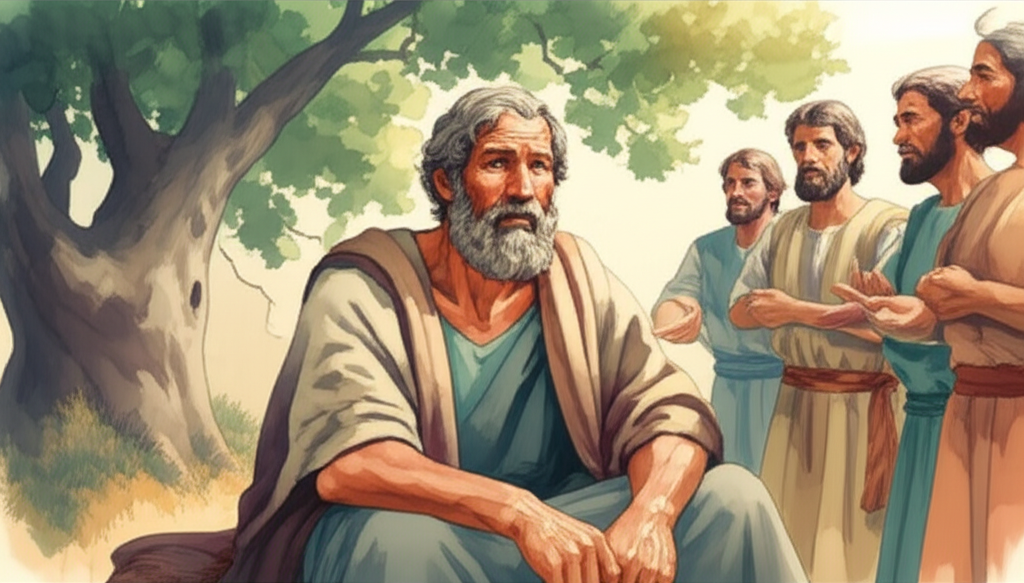

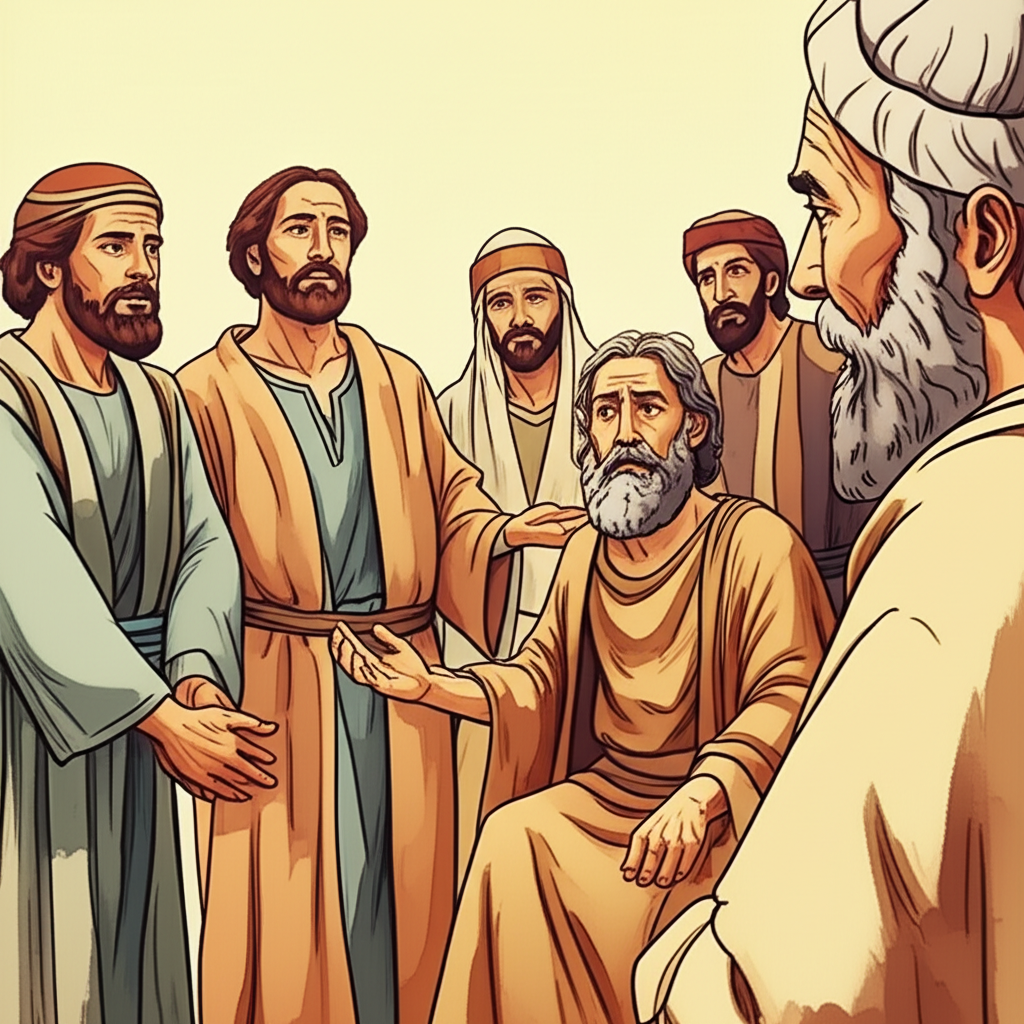


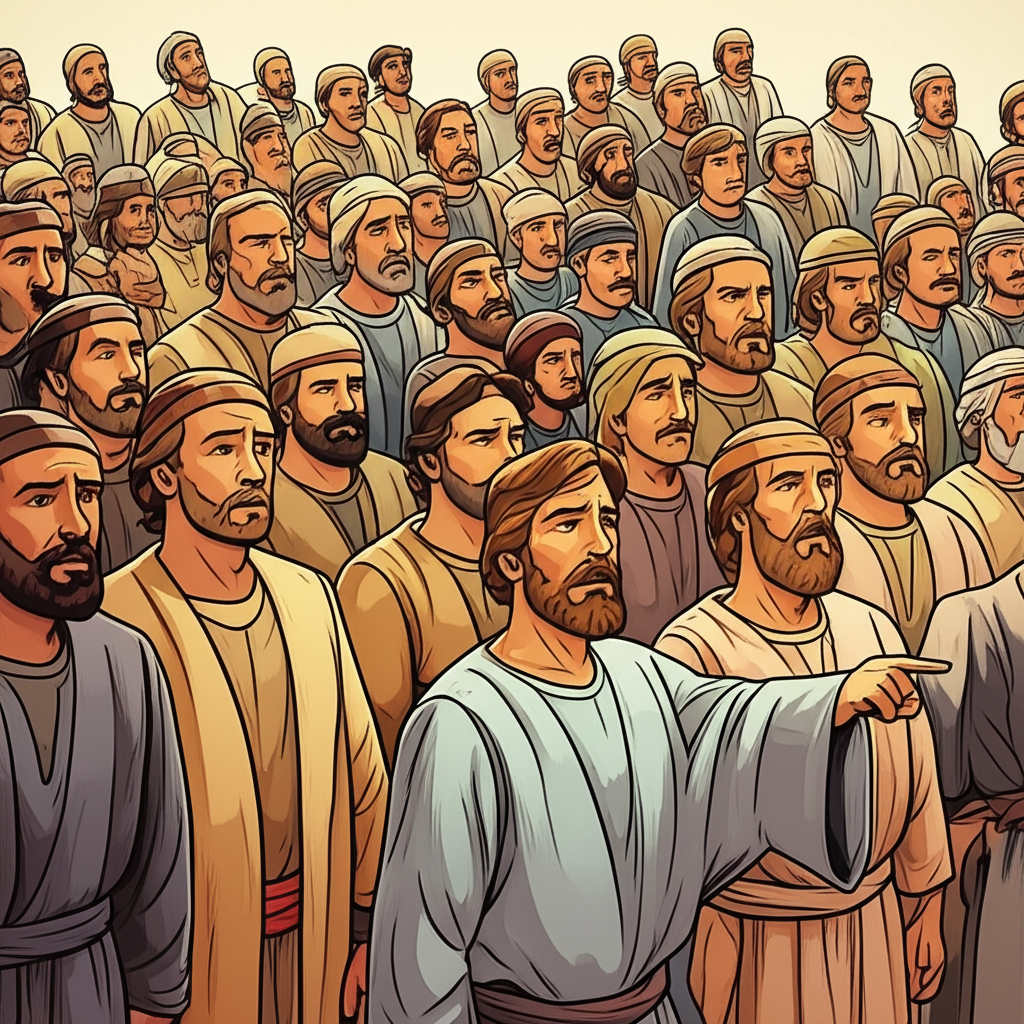

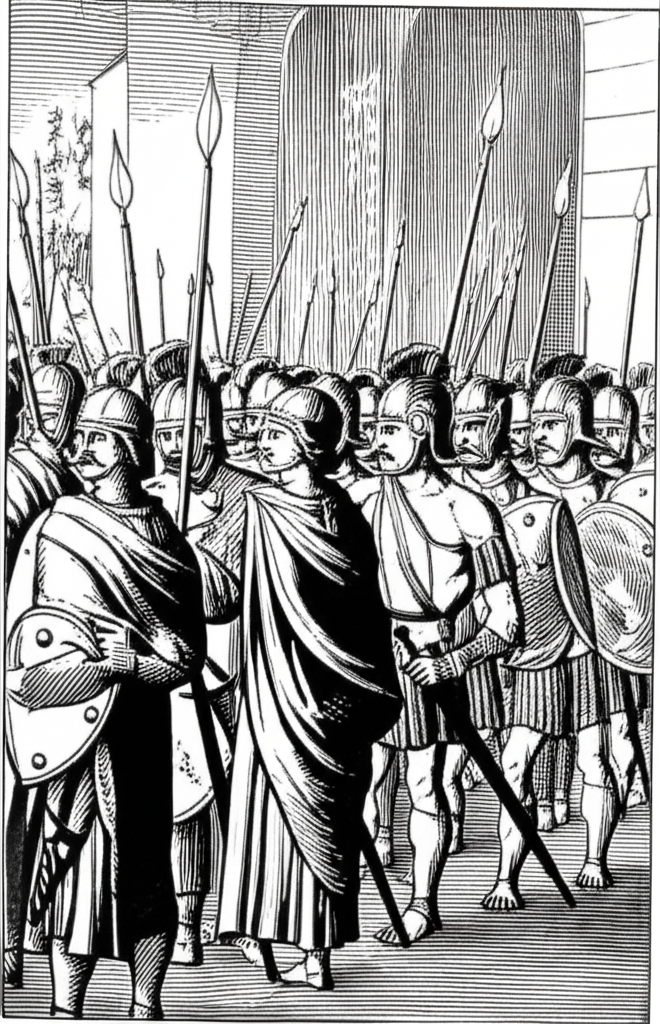
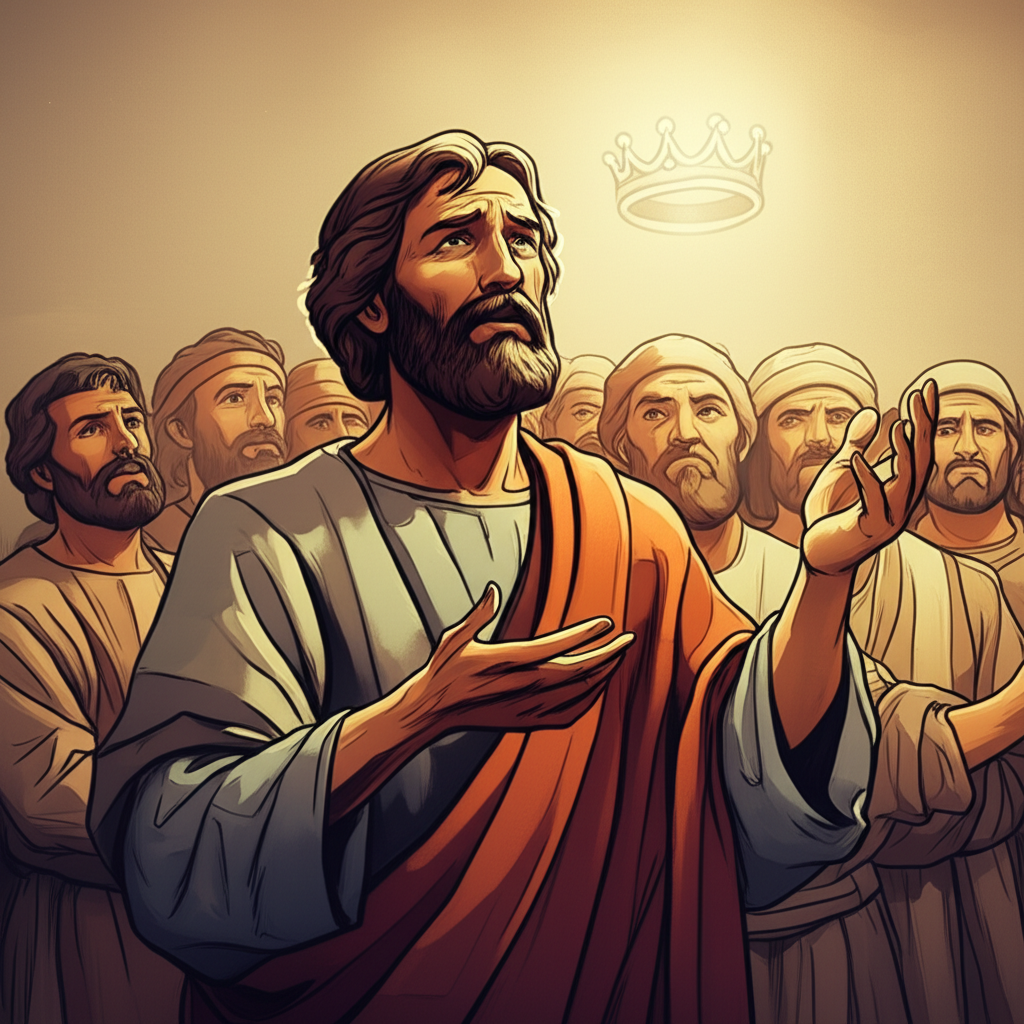
1 Samuel chapter 8 kjv
- 1 And it came to pass, when Samuel was old, that he made his sons judges over Israel.
- 2 Now the name of his firstborn was Joel; and the name of his second, Abiah: they were judges in Beersheba.
- 3 And his sons walked not in his ways, but turned aside after lucre, and took bribes, and perverted judgment.
- 4 Then all the elders of Israel gathered themselves together, and came to Samuel unto Ramah,
- 5 And said unto him, Behold, thou art old, and thy sons walk not in thy ways: now make us a king to judge us like all the nations.
- 6 But the thing displeased Samuel, when they said, Give us a king to judge us. And Samuel prayed unto the LORD.
- 7 And the LORD said unto Samuel, Hearken unto the voice of the people in all that they say unto thee: for they have not rejected thee, but they have rejected me, that I should not reign over them.
- 8 According to all the works which they have done since the day that I brought them up out of Egypt even unto this day, wherewith they have forsaken me, and served other gods, so do they also unto thee.
- 9 Now therefore hearken unto their voice: howbeit yet protest solemnly unto them, and show them the manner of the king that shall reign over them.
- 10 And Samuel told all the words of the LORD unto the people that asked of him a king.
- 11 And he said, This will be the manner of the king that shall reign over you: He will take your sons, and appoint them for himself, for his chariots, and to be his horsemen; and some shall run before his chariots.
- 12 And he will appoint him captains over thousands, and captains over fifties; and will set them to ear his ground, and to reap his harvest, and to make his instruments of war, and instruments of his chariots.
- 13 And he will take your daughters to be confectionaries, and to be cooks, and to be bakers.
- 14 And he will take your fields, and your vineyards, and your oliveyards, even the best of them, and give them to his servants.
- 15 And he will take the tenth of your seed, and of your vineyards, and give to his officers, and to his servants.
- 16 And he will take your menservants, and your maidservants, and your goodliest young men, and your asses, and put them to his work.
- 17 He will take the tenth of your sheep: and ye shall be his servants.
- 18 And ye shall cry out in that day because of your king which ye shall have chosen you; and the LORD will not hear you in that day.
- 19 Nevertheless the people refused to obey the voice of Samuel; and they said, Nay; but we will have a king over us;
- 20 That we also may be like all the nations; and that our king may judge us, and go out before us, and fight our battles.
- 21 And Samuel heard all the words of the people, and he rehearsed them in the ears of the LORD.
- 22 And the LORD said to Samuel, Hearken unto their voice, and make them a king. And Samuel said unto the men of Israel, Go ye every man unto his city.
1 Samuel chapter 8 nkjv
- 1 Now it came to pass when Samuel was old that he made his sons judges over Israel.
- 2 The name of his firstborn was Joel, and the name of his second, Abijah; they were judges in Beersheba.
- 3 But his sons did not walk in his ways; they turned aside after dishonest gain, took bribes, and perverted justice.
- 4 Then all the elders of Israel gathered together and came to Samuel at Ramah,
- 5 and said to him, "Look, you are old, and your sons do not walk in your ways. Now make us a king to judge us like all the nations."
- 6 But the thing displeased Samuel when they said, "Give us a king to judge us." So Samuel prayed to the LORD.
- 7 And the LORD said to Samuel, "Heed the voice of the people in all that they say to you; for they have not rejected you, but they have rejected Me, that I should not reign over them.
- 8 According to all the works which they have done since the day that I brought them up out of Egypt, even to this day?with which they have forsaken Me and served other gods?so they are doing to you also.
- 9 Now therefore, heed their voice. However, you shall solemnly forewarn them, and show them the behavior of the king who will reign over them."
- 10 So Samuel told all the words of the LORD to the people who asked him for a king.
- 11 And he said, "This will be the behavior of the king who will reign over you: He will take your sons and appoint them for his own chariots and to be his horsemen, and some will run before his chariots.
- 12 He will appoint captains over his thousands and captains over his fifties, will set some to plow his ground and reap his harvest, and some to make his weapons of war and equipment for his chariots.
- 13 He will take your daughters to be perfumers, cooks, and bakers.
- 14 And he will take the best of your fields, your vineyards, and your olive groves, and give them to his servants.
- 15 He will take a tenth of your grain and your vintage, and give it to his officers and servants.
- 16 And he will take your male servants, your female servants, your finest young men, and your donkeys, and put them to his work.
- 17 He will take a tenth of your sheep. And you will be his servants.
- 18 And you will cry out in that day because of your king whom you have chosen for yourselves, and the LORD will not hear you in that day."
- 19 Nevertheless the people refused to obey the voice of Samuel; and they said, "No, but we will have a king over us,
- 20 that we also may be like all the nations, and that our king may judge us and go out before us and fight our battles."
- 21 And Samuel heard all the words of the people, and he repeated them in the hearing of the LORD.
- 22 So the LORD said to Samuel, "Heed their voice, and make them a king." And Samuel said to the men of Israel, "Every man go to his city."
1 Samuel chapter 8 niv
- 1 When Samuel grew old, he appointed his sons as Israel's leaders.
- 2 The name of his firstborn was Joel and the name of his second was Abijah, and they served at Beersheba.
- 3 But his sons did not follow his ways. They turned aside after dishonest gain and accepted bribes and perverted justice.
- 4 So all the elders of Israel gathered together and came to Samuel at Ramah.
- 5 They said to him, "You are old, and your sons do not follow your ways; now appoint a king to lead us, such as all the other nations have."
- 6 But when they said, "Give us a king to lead us," this displeased Samuel; so he prayed to the LORD.
- 7 And the LORD told him: "Listen to all that the people are saying to you; it is not you they have rejected, but they have rejected me as their king.
- 8 As they have done from the day I brought them up out of Egypt until this day, forsaking me and serving other gods, so they are doing to you.
- 9 Now listen to them; but warn them solemnly and let them know what the king who will reign over them will claim as his rights."
- 10 Samuel told all the words of the LORD to the people who were asking him for a king.
- 11 He said, "This is what the king who will reign over you will claim as his rights: He will take your sons and make them serve with his chariots and horses, and they will run in front of his chariots.
- 12 Some he will assign to be commanders of thousands and commanders of fifties, and others to plow his ground and reap his harvest, and still others to make weapons of war and equipment for his chariots.
- 13 He will take your daughters to be perfumers and cooks and bakers.
- 14 He will take the best of your fields and vineyards and olive groves and give them to his attendants.
- 15 He will take a tenth of your grain and of your vintage and give it to his officials and attendants.
- 16 Your male and female servants and the best of your cattle and donkeys he will take for his own use.
- 17 He will take a tenth of your flocks, and you yourselves will become his slaves.
- 18 When that day comes, you will cry out for relief from the king you have chosen, but the LORD will not answer you in that day."
- 19 But the people refused to listen to Samuel. "No!" they said. "We want a king over us.
- 20 Then we will be like all the other nations, with a king to lead us and to go out before us and fight our battles."
- 21 When Samuel heard all that the people said, he repeated it before the LORD.
- 22 The LORD answered, "Listen to them and give them a king." Then Samuel said to the Israelites, "Everyone go back to your own town."
1 Samuel chapter 8 esv
- 1 When Samuel became old, he made his sons judges over Israel.
- 2 The name of his firstborn son was Joel, and the name of his second, Abijah; they were judges in Beersheba.
- 3 Yet his sons did not walk in his ways but turned aside after gain. They took bribes and perverted justice.
- 4 Then all the elders of Israel gathered together and came to Samuel at Ramah
- 5 and said to him, "Behold, you are old and your sons do not walk in your ways. Now appoint for us a king to judge us like all the nations."
- 6 But the thing displeased Samuel when they said, "Give us a king to judge us." And Samuel prayed to the LORD.
- 7 And the LORD said to Samuel, "Obey the voice of the people in all that they say to you, for they have not rejected you, but they have rejected me from being king over them.
- 8 According to all the deeds that they have done, from the day I brought them up out of Egypt even to this day, forsaking me and serving other gods, so they are also doing to you.
- 9 Now then, obey their voice; only you shall solemnly warn them and show them the ways of the king who shall reign over them."
- 10 So Samuel told all the words of the LORD to the people who were asking for a king from him.
- 11 He said, "These will be the ways of the king who will reign over you: he will take your sons and appoint them to his chariots and to be his horsemen and to run before his chariots.
- 12 And he will appoint for himself commanders of thousands and commanders of fifties, and some to plow his ground and to reap his harvest, and to make his implements of war and the equipment of his chariots.
- 13 He will take your daughters to be perfumers and cooks and bakers.
- 14 He will take the best of your fields and vineyards and olive orchards and give them to his servants.
- 15 He will take the tenth of your grain and of your vineyards and give it to his officers and to his servants.
- 16 He will take your male servants and female servants and the best of your young men and your donkeys, and put them to his work.
- 17 He will take the tenth of your flocks, and you shall be his slaves.
- 18 And in that day you will cry out because of your king, whom you have chosen for yourselves, but the LORD will not answer you in that day."
- 19 But the people refused to obey the voice of Samuel. And they said, "No! But there shall be a king over us,
- 20 that we also may be like all the nations, and that our king may judge us and go out before us and fight our battles."
- 21 And when Samuel had heard all the words of the people, he repeated them in the ears of the LORD.
- 22 And the LORD said to Samuel, "Obey their voice and make them a king." Samuel then said to the men of Israel, "Go every man to his city."
1 Samuel chapter 8 nlt
- 1 As Samuel grew old, he appointed his sons to be judges over Israel.
- 2 Joel and Abijah, his oldest sons, held court in Beersheba.
- 3 But they were not like their father, for they were greedy for money. They accepted bribes and perverted justice.
- 4 Finally, all the elders of Israel met at Ramah to discuss the matter with Samuel.
- 5 "Look," they told him, "you are now old, and your sons are not like you. Give us a king to judge us like all the other nations have."
- 6 Samuel was displeased with their request and went to the LORD for guidance.
- 7 "Do everything they say to you," the LORD replied, "for they are rejecting me, not you. They don't want me to be their king any longer.
- 8 Ever since I brought them from Egypt they have continually abandoned me and followed other gods. And now they are giving you the same treatment.
- 9 Do as they ask, but solemnly warn them about the way a king will reign over them."
- 10 So Samuel passed on the LORD's warning to the people who were asking him for a king.
- 11 "This is how a king will reign over you," Samuel said. "The king will draft your sons and assign them to his chariots and his charioteers, making them run before his chariots.
- 12 Some will be generals and captains in his army, some will be forced to plow in his fields and harvest his crops, and some will make his weapons and chariot equipment.
- 13 The king will take your daughters from you and force them to cook and bake and make perfumes for him.
- 14 He will take away the best of your fields and vineyards and olive groves and give them to his own officials.
- 15 He will take a tenth of your grain and your grape harvest and distribute it among his officers and attendants.
- 16 He will take your male and female slaves and demand the finest of your cattle and donkeys for his own use.
- 17 He will demand a tenth of your flocks, and you will be his slaves.
- 18 When that day comes, you will beg for relief from this king you are demanding, but then the LORD will not help you."
- 19 But the people refused to listen to Samuel's warning. "Even so, we still want a king," they said.
- 20 "We want to be like the nations around us. Our king will judge us and lead us into battle."
- 21 So Samuel repeated to the LORD what the people had said,
- 22 and the LORD replied, "Do as they say, and give them a king." Then Samuel agreed and sent the people home.
- Bible Book of 1 Samuel
- 1 Story of Hannah
- 2 Hannah's song and Prayer
- 3 Story of Samuel
- 4 The Philistines Capture the Ark
- 5 The Philistines and the Ark
- 6 The Ark Returned to Israel
- 7 Samuel Judges Israel
- 8 Israel Asks for a King
- 9 Saul the first king of Israel
- 10 Samuel Anoints Saul as King
- 11 Saul Defeats the Ammonites
- 12 Samuel's Farewell Address
- 13 Saul Fights the Philistines
- 14 Story of Jonathan
- 15 Saul and the Amalekites
- 16 David annointed
- 17 David and Goliath story
- 18 David and Jonathan's Friendship
- 19 Saul Tries to Kill David
- 20 Jonathan Warns David
- 21 David and the Holy Bread
- 22 David in the cav of Adullam
- 23 David Saves the City of Keilah
- 24 David Spares Saul's Life
- 25 Death of Samuel and Abigail
- 26 David Spares Saul Again
- 27 David Flees to the Philistines
- 28 Saul consults the Witch of Endor
- 29 The Philistines Reject David
- 30 David's Wives Are Captured
- 31 Death of Saul